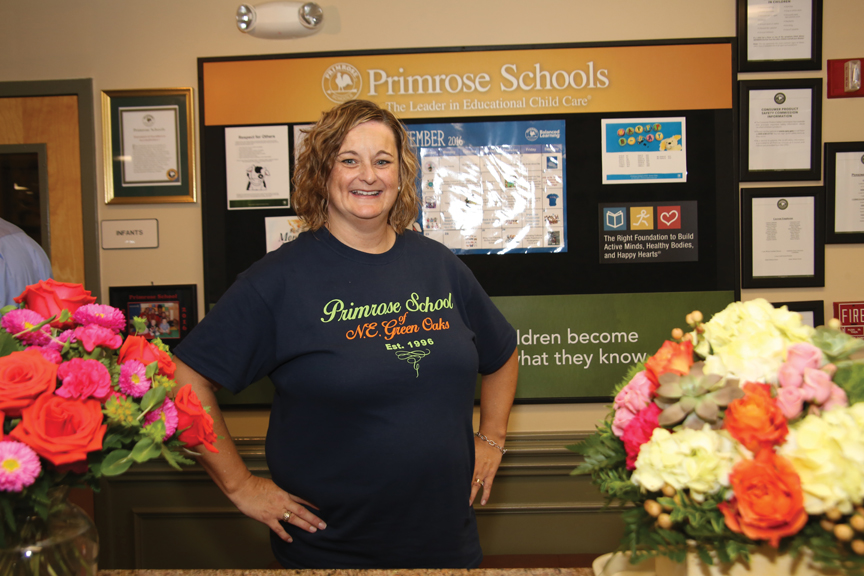
It’s natural, changing schools after many years,
to reflect fondly, if a bit wistfully about good times with good friends. Cooper Clute certainly feels that way, even though he’s just five years old.
Cooper, a student at Arlington’s Primrose School from infancy through kindergarten, was there with his family last month as the school celebrated its 20th anniversary. Now at C.C. Duff Elementary, he sums up his Primrose years succinctly: “It was fun.”
It was, in fact, much more than just fun, says his mom, Erin. “Primrose really did a lot for him. He was more than prepared for public school. He’s really confident and good with other kids, respectful of teachers, and I think he got a lot of that here.”
Arlington’s Primrose, one of several in the Metroplex,
opened in September 1996 because Lynne Groff, working in a child care center while on her way to a master’s in social work at UTA, had seen a better way.
“There’s nothing wrong with daycare”, says Groff, Primrose’s executive director, “but there’s a big difference between daycare and an educational pre-school. I felt there needed to be a foundation that could be built upon every day throughout the years.”
Her parents, Jim and Isobel Morton, bought into that dream, and the trio decided to make it a reality. Research led them to Primrose, a school established in Georgia in 1982 that has since grown to a network of more than 300 franchises providing early childhood education to more than 60,000 students in 23 states.
Primrose’s concept of Balanced Learning dovetails nicely with Groff’s vision. “Our curriculum is educationally based,” she says. “Everything is purposeful play.”
The curriculum is divided into age groups
– from infant through toddler and pre-school to kindergarten. Learning occurs in eight areas – approaches to learning, social studies, language and literacy, social and emotional, physical, creative arts, science and engineering, and math.
Everything taught, however, is balanced to the age of the student. Language, social studies and math, for instance, receive far more emphasis in kindergarten than in the toddler room, but everything builds onto and is connected with prior lessons. “We focus on what we call ‘scaffolding,’” Groff says. “Having that foundation is so important.”
If foundational learning is important, so is just plain silliness. In selecting teachers, Groff looks for people who are genuinely engaged with their students – including acting goofy on occasion, getting down (literally) to the kids’ level.
“You really have to have a passion for learning,” she says, “but you have to have a passion for being silly, too.”
It’s a winning combination,
and so is Primrose Arlington. But it is much more than just the franchise owners – Groff is the educational expert, Jim’s the accountant and Isobel handles technology. It’s that kind of hands-on, here-every- day approach that has led to the winning of two Primrose President’s Awards – the only school to have done so.
Primrose Arlington hasn’t changed much over the past two decades, and Groff doesn’t expect much more over the next two … in ways that really matter, that is. “I think it comes down to what we have in place,” she says. “Sure, I see us staying ahead of the curve in technology and academics, but we’ll always be the same people with the same philosophy.”
The Clute family sure hopes so. Cooper may have moved on, but baby brother Carson is in the infant room and the third Clute kid – gender TBD – is on the way.
Says dad Jason, “We’ll be a Primrose family for a looooong time.”
















